Kermit - 20 - Its/Its - This is where I post my project updates. For more BS follow @Kermit-Official.
Last active 60 minutes ago
Don't wanna be here? Send us removal request.
Note
how do you pick your colours? They're so rich and gorgeous
HII SORRY TY FOR BEING SO PATIENT i get a handful of questions like this so i thought i would try to make a (somewhat) proper guide kinda
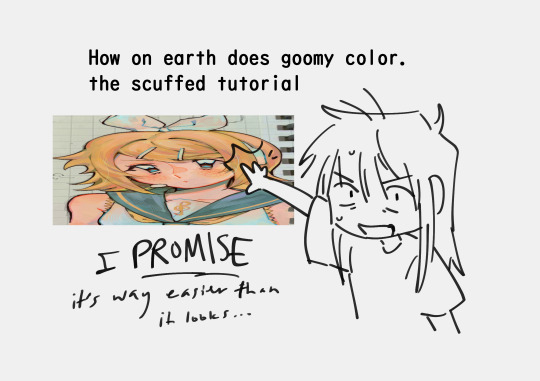
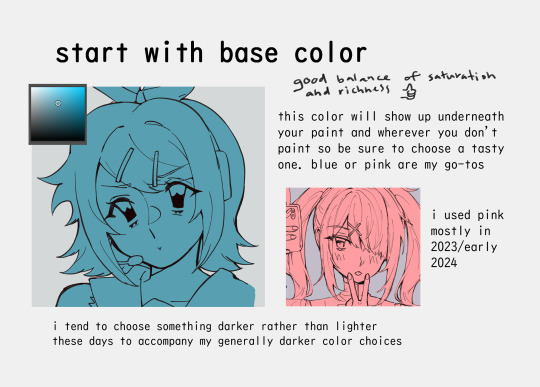
i also occasionally use orange, yellow, or Miku Blue as a base color
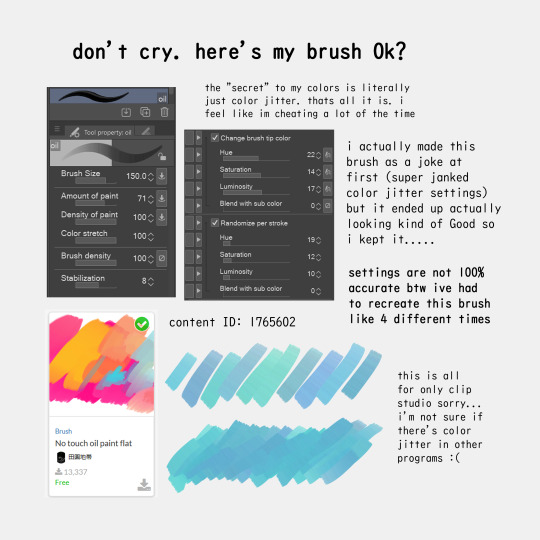
this brush has been saving my ass for the past year please download!
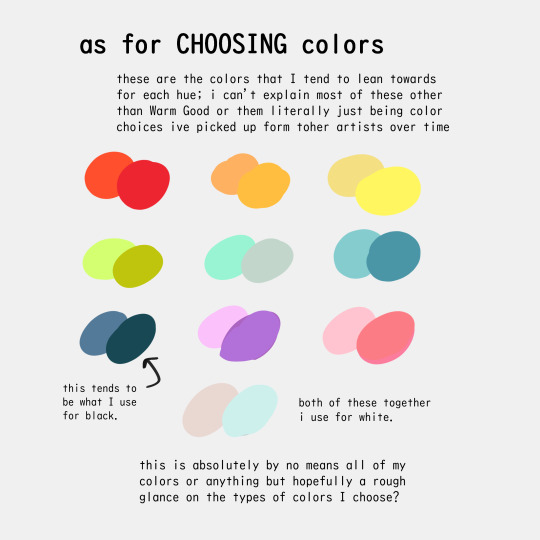

i think ive made a similar art tip waaaay in the past but having colored backgrounds in general (like bright pink or red, or even black) can really affect how you choose your colors!


i hope this made Some amount of sense!
1K notes
·
View notes
Text
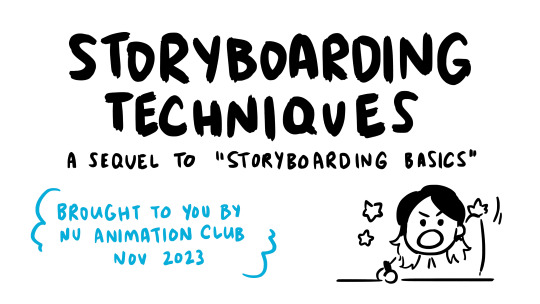
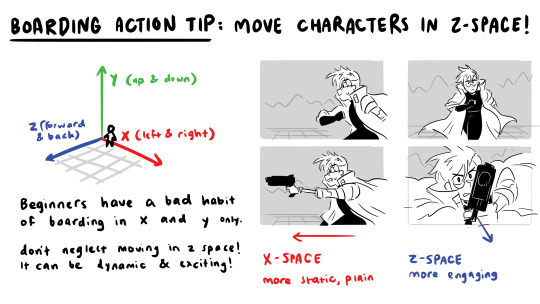

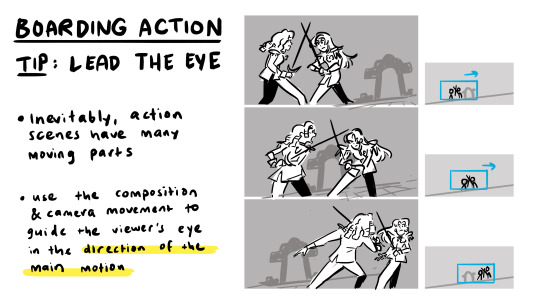
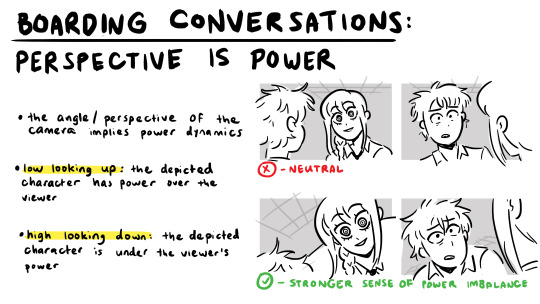
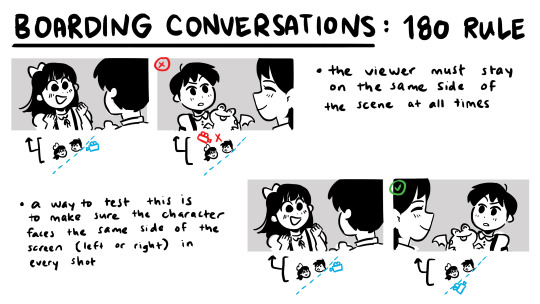
some storyboarding techniques as a sequel to my storyboarding basics presentation. I focus specifically on tips for action and conversation scenes!
as always, these are general tips and tricks, but rules can always be broken. happy boarding! ✍️✨
22K notes
·
View notes
Text
1) Width. Add it.
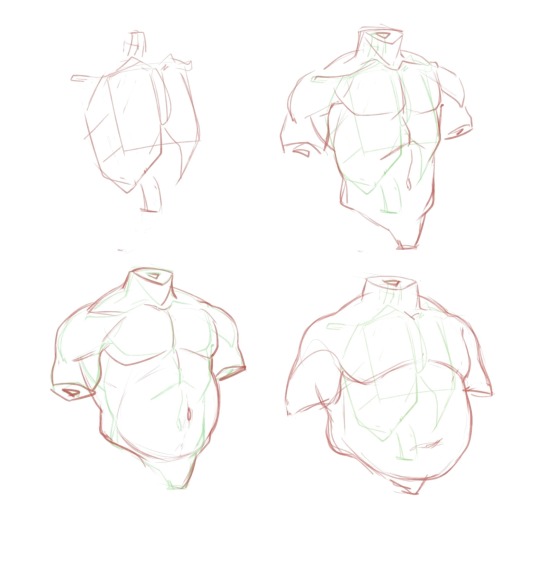
2) Width. Just. Yeah. If you want to draw a really big guy - do it. The third guy is ok, but it's just a small guy with belly!
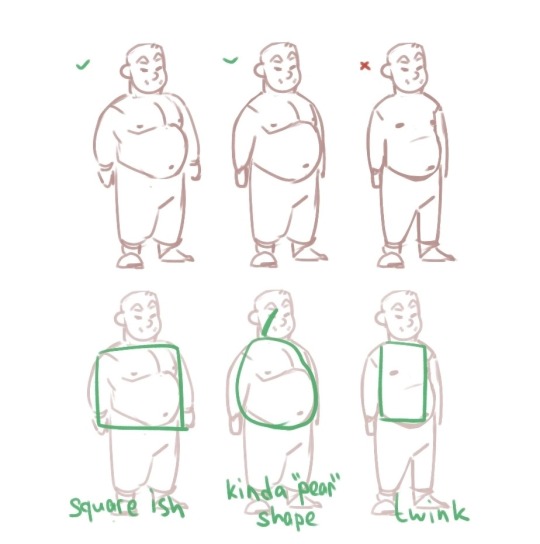
3) Gravity! More fat - more soft - gravity goes brr.
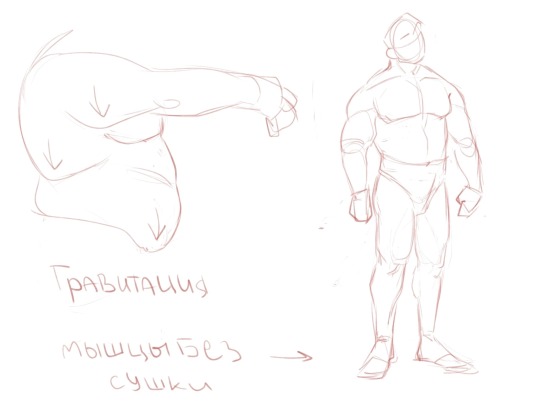
4) Basic shapes and clothes would definitely help you to draw a big comfy soft guy!
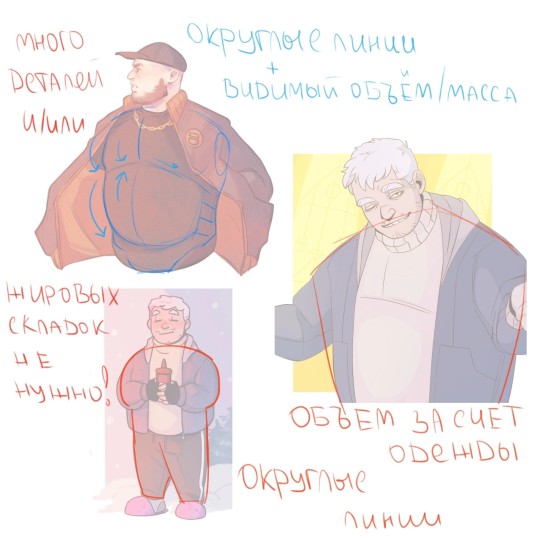
Miaou
37K notes
·
View notes
Text
bgs are hard but at least this makes it easier T_T
16K notes
·
View notes
Text
I forgot I have to be active here so here’s my Twitter tutorial on how to draw folds I made a while back to help a friend!
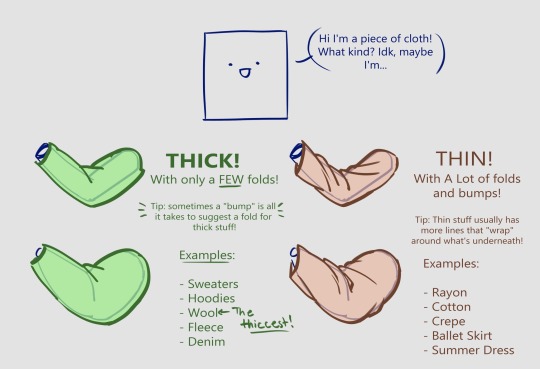
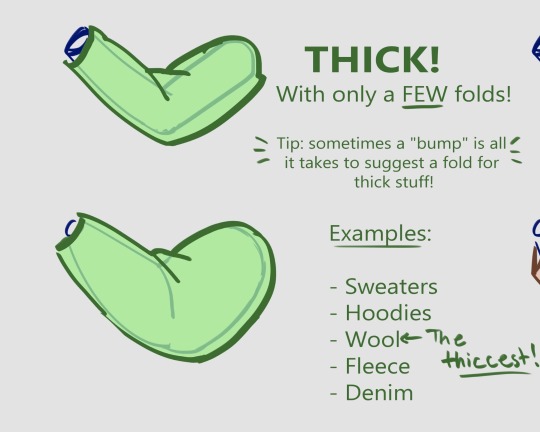
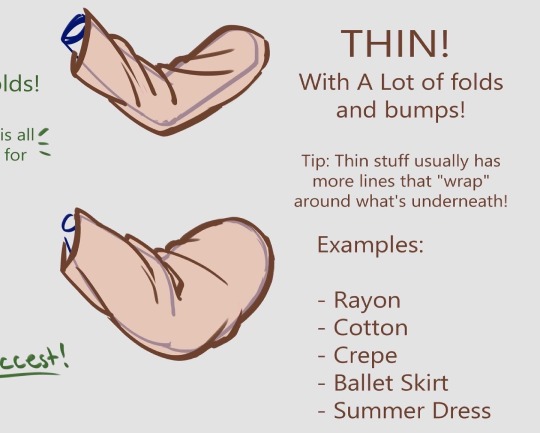

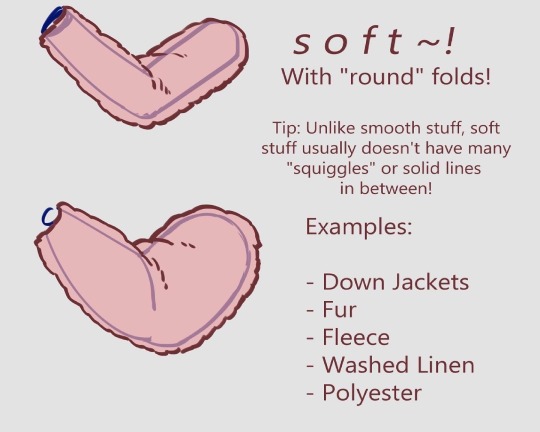
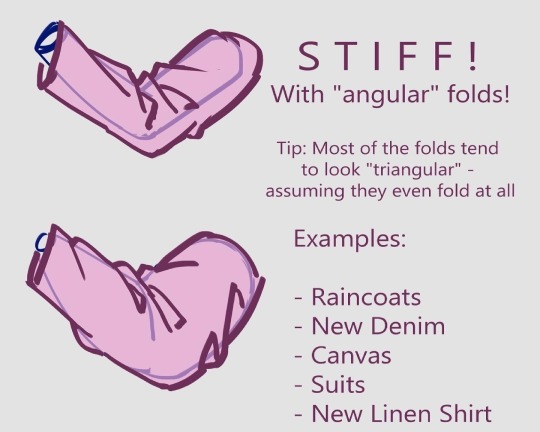
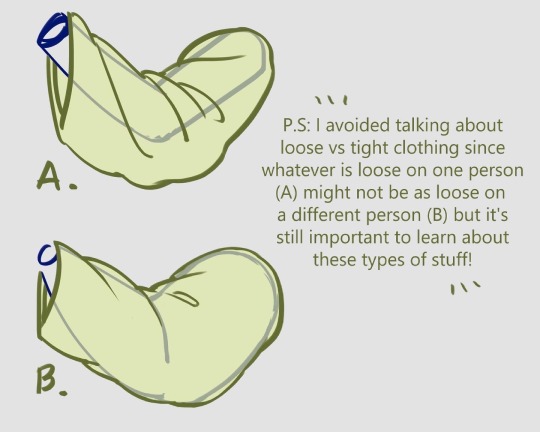

180K notes
·
View notes
Text
STORYBOARD/ANIMATIC TIPS
ko-fi✏️
I made these for my friends, but I thought that might be helpful for yall as well! hehe! Now whenever someone asks for storyboard tips I can throw this at them!
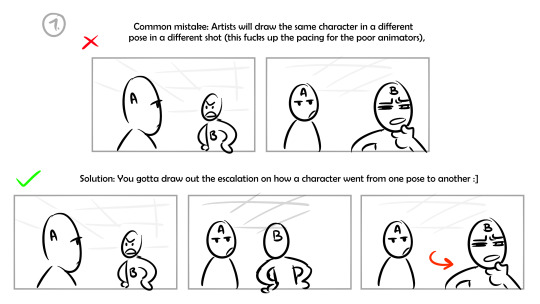
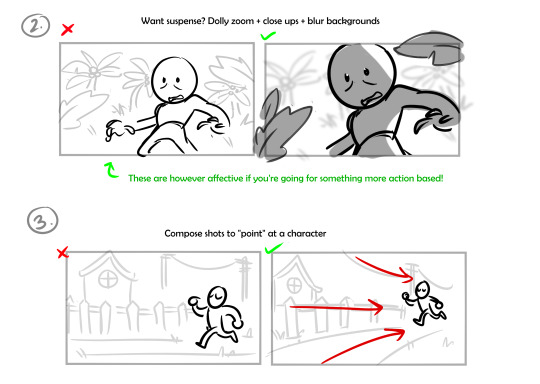

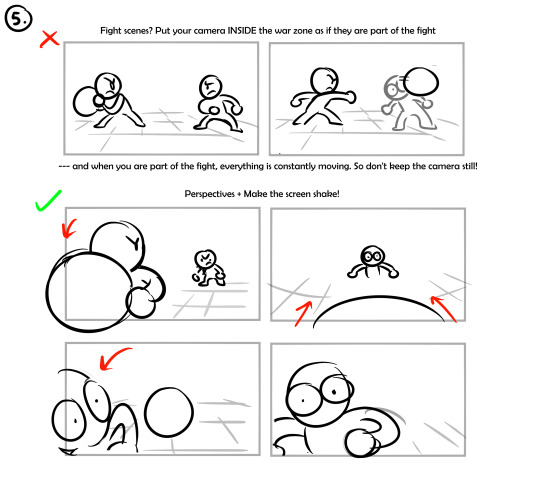
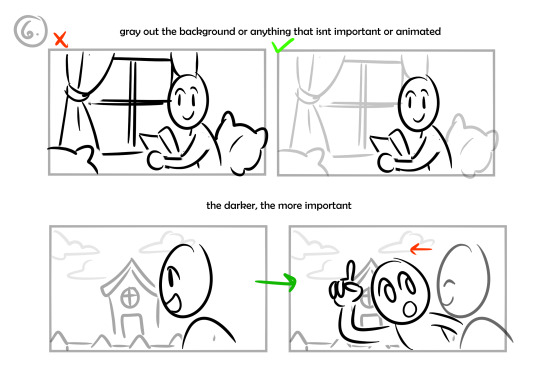
Examples of storyboards I made for fun:
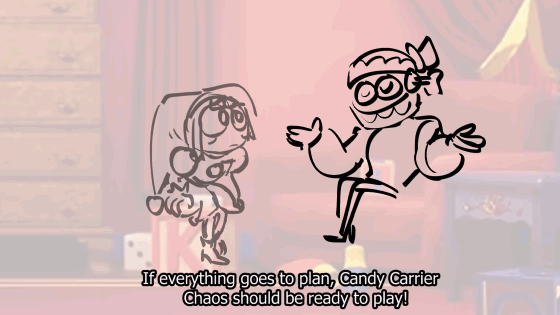

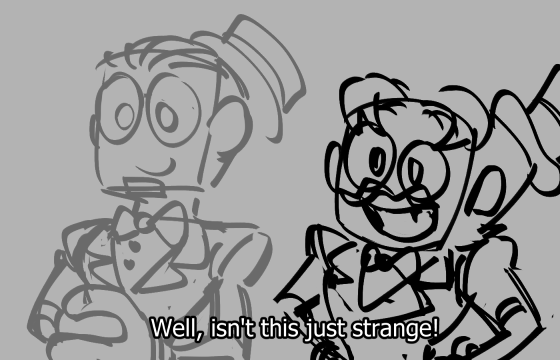
24K notes
·
View notes
Text
Well.. Consider me holding myself accountable.
I loved the idea of NaNoWriMo, and this year, I decided I was gonna buckle down and try to participate. Until... Well... If you know you know.
But I still wanted to do SOMETHING. Then I stumbled onto @roughdraftmonth - and decided that this was even better than what I had originally intended. So, consider me participating.
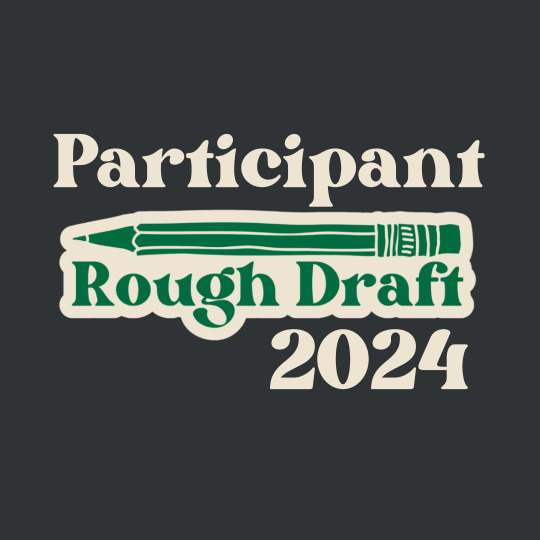
Project details below!
In November, I've decided I'm going to fully realize the game idea I've been spinning in my head for months. Now I'd like to clarify, I don't expect to get the game done in a month (I don't know a thing about game making), my idea is instead to work on something each day, and call that reaching my goal. As long as I've done something, that's my success.
In the end, I hope to be able to compile everything I've done in the month in one place and see real, tangible progress.
Ideas for what I might do in a day:
- Storyboard. Put the full idea down on paper.
- Write dialogue. I plan on dialogue trees, so there's going to be a lot of that.
- Make character refs. Self explanatory.
- Work on sprites. I'm planning on a pixel game, so I can begin work on sprites and backgrounds.
- Learn to make a game. Look into engines and codes and start practicing so that I can eventually make the game run.
And once I've done all of that, if I'm feeling up to it, I'll post bits of my progress here. And at the end of the month, I'll show off what I've compiled.
As a treat for reading this far, you get to have a peak at the low poly model and art I made for our main character. Finally, introducing to the world: TV Head Ted.




8 notes
·
View notes
Text
List of Interesting Latin Phrases
A list I made just to satisfy my vain cravings for resonating mottos for a secret society I'm working on. Enjoy!
abi in malam crucem: to the devil with you!
ad astra per ardua: to the star by steep paths
ad augusta per angusta: to honors through difficulties
aegis fortissima virtus: virue is the strongest shield
amor vincit amnia: love conquers all things
animo et fide: by courage and faith
arbitrium est judicium: an award is a judgement
aut mors aut victoria: either death or victory
aut vincere aut mori: either victory or death
bello ac pace paratus: prepared in war and peace
bibamus, moriendum est: let us drink, death is certain (Seneca and Elder)
bonis omnia bona: all things are good to the good
cede nullis: yield to no one
cito maturum, cito putridum: soon ripe, soon rotten
consensus facit legem: consent makes law
data fata secutus: following what is decreed by fate (Virgil)
durum telum necessitas: necessity is a hrad weapson
dux vitae ratio: reason is the guide of life
e fungis nati homines: men born of mushrooms
ego sum, ergo omnia sunt: I am, therefore all things are
pulvis et umbra sumus: we are but dust and shadow
quae amissa salva: things lost are safe
timor mortis morte pejor: the fear of death is worse than death
triumpho morte tam vita: I triumph in death as in life
tu vincula frange: break your chains
vel prece vel pretio: for either love or for money
verbera, sed audi: whip me, but hear me
veritas temporis filia: truth is the daughter of time
vero nihil verius: nothing is truer than the truth
vestigia nulla restrorsum: foosteps do not go backward
victus vincimus: conquered, we conquer (Plautus)
sica inimicis: a gger to his enemies
sic vita humana: thus is human life
─── ・ 。゚☆: *.☽ .* . ───
💎If you like my blog, buy me a coffee☕ and find me on instagram! Also, join my Tumblr writing community for some more fun.
💎Before you ask, check out my masterpost part 1 and part 2
Reference: <Latin for the Illiterati: a modern guide to an ancient language> by Jon R. Stone, second edition, 2009
9K notes
·
View notes
Text
ur future nurse is using chapgpt to glide thru school u better take care of urself
154K notes
·
View notes
Text
I LOVE IT WHEN ENDINGS CIRCLE BACK TO THE BEGINNING!!!
I LOVE IT WHEN CHARACTERS MIRROR EACH OTHER!!!!!
I LOVE IT WHEN CHARACTERS SEAL THEIR FATES IN THEIR FIRST SCENES!!!!
I LOVE IT WHEN CHARACTERS' GREATEST TRAITS ARE ALSO WHAT DOOM THEM IN THE END!!!!!
47K notes
·
View notes
Text
words to use instead of ______
"Very"
Mild: clearly, decidedly, distinctly, markedly, considerably, notably, largely, recognizably, especially, indubitably Moderate: especially, surprisingly, substantially, uncommonly, chiefly, incredibly, obviously, unmistakably, considerably, awfully, wonderfully, particularly Bold: profusely, unequivocally, strikingly, astonishingly, exceedingly, absolutely, exceptionally, extremely, unquestionably, vastly, incontestably
"A Lot" (time)
Mild: often, oftentimes, sometime Moderate: frequently, usually, various, generally Bold: regularly, recurrent, persistent
"A Lot" (size)
Mild: many, much, several Moderate: numerous, bountiful, considerable Bold: multitude, profuse, vast
"Big"
Mild: sizable, ample, large, considerable, great, above average, important Moderate: ponderous, significant, crucial, vast, copious, magnificent, substantial Bold: enormous, immense, colossal, extensive, endless, paramount, boundless, prodigious, imposing, gigantic, voluminous, limitless, essential
"Small"
Mild: slight, limited, trivial, minor, light, puny, superficial, undersized, dinky, negligible, faint Moderate: scant, petite, inconsiderable, microscopic, dwarf, unsubstantial, minimum, miniature, tiny Bold: insignificant, minute, meager, infinitesimal, ineffectual, undetectable, inconsequential
"Good"
Mild: acceptable, favorable, agreeable, pleasing, satisfactory, satisfying, super, able, relevant, accomplished, efficient, reliable, ample, useful, profitable, adequate, adept Moderate: great, honorable, admirable, commendable, sound, splendid, superb, valuable, wonderful, worthy, clever, proficient, qualified, apt, skillful, thorough, wholesome Bold: excellent, exceptional, gratifying, marvelous, reputable, stupendous, superior, exemplary, virtuous, expert, solid, advantageous, flawless, extensive, perfect
"Bad"
Mild: cheap, dissatisfactory, faculty, off, mean, wrong, unpleasant, unwell, low, grim, sour, regretful Moderate: careless, defective, inferior, imperfect, deficient, rough, ill-suited, inadequate, unsatisfactory, delinquent, sinful, unruly, wicked, rancid, grave, harsh, terrible, downcast Bold: awful, unacceptable, corrupt, dreadful, putrid, erroneous, detrimental, ruinous, vile, villainous, diseased, adverse, evil
more words to use instead other words to use instead even more words to use instead
12K notes
·
View notes
Text
How to show emotions
Part IV
How to show bitterness
tightness around their eyes
pinched mouth
sour expression on their face
crossed arms
snorting angrily
turning their eyes upward
shaking their head
How to show hysteria
fast breathing
chest heaving
trembling of their hands
weak knees, giving in
tears flowing down their face uncontrollably
laughing while crying
not being able to stand still
How to show awe
tension leaving their body
shoulders dropping
standing still
opening mouth
slack jaw
not being able to speak correctly
slowed down breathing
wide eyes open
softening their gaze
staring unabashingly
How to show shame
vacant stare
looking down
turning their head away
cannot look at another person
putting their head into their hands
shaking their head
How to show being flustered
blushing
looking down
nervous smile
sharp intake of breath
quickening of breath
blinking rapidly
breaking eye contact
trying to busy their hands
playing with their hair
fidgeting with their fingers
opening mouth without speaking
Part I + Part II + Part III + Part V
If you like my blog and want to support me, you can buy me a coffee or become a member! And check out my Instagram! 🥰
44K notes
·
View notes
Text
20 Emotional Wounds in Fiction That Make Readers Root for the Character
Abandonment: Characters who have been abandoned by loved ones or caregivers can evoke sympathy from readers.
Betrayal: Being betrayed by someone close can create deep emotional wounds that make readers empathize with the character.
Loss of a Loved One: Whether through death or separation, the loss of a loved one can be a powerful emotional wound.
Rejection: Characters who experience rejection, whether in relationships or by society, can be relatable and evoke empathy.
Abuse: Physical, emotional, or psychological abuse can create complex wounds that shape a character's personality and behavior.
Neglect: Characters who have been neglected, especially in childhood, can evoke sympathy from readers.
Failure: Experiencing a significant failure or loss can create emotional wounds that make characters more relatable.
Guilt: Characters who carry guilt for past actions or decisions can be compelling and evoke empathy from readers.
Shame: Feelings of shame can create internal conflict and make characters more relatable and sympathetic.
Injustice: Characters who have experienced injustice or unfair treatment can evoke strong emotions from readers.
Trauma: Characters who have experienced traumatic events, such as war or natural disasters, can be sympathetic and relatable.
Loneliness: Characters who feel lonely or isolated can evoke empathy from readers who have experienced similar feelings.
Fear: Characters who face their fears or struggle with phobias can be relatable and evoke empathy from readers.
Self-doubt: Characters who struggle with self-doubt or low self-esteem can be relatable and evoke sympathy.
Identity Crisis: Characters who are grappling with questions of identity or struggling to find their place in the world can be sympathetic.
Addiction: Characters who struggle with addiction can be complex and evoke empathy from readers.
Betrayal of Trust: Characters who have had their trust betrayed can be sympathetic and relatable.
Unrequited Love: Characters who experience unrequited love can be sympathetic and evoke empathy from readers.
Isolation: Characters who feel isolated or disconnected from others can be relatable and evoke sympathy.
Fear of Failure: Characters who struggle with a fear of failure can be relatable and evoke empathy from readers.
11K notes
·
View notes
Text
Quick Tips for Writing Heartbreak Tension
They can’t look at each other because if they do, all those emotions are going to come rushing back.
One of them goes from pouring out their heart to just giving dry, emotionless answers. It’s like a wall went up instantly.
They start bringing up the good times, but it only makes the heartbreak worse. Cue the awkward silence after.
“I wanted to tell you that…” but then they stop, realizing it won’t change anything.
One acts like the breakup or heartbreak didn’t matter, but the other sees right through the fake smile.
if you have any questions or feedback on writing materials, please send me an email at [email protected] ✍🏻
1K notes
·
View notes
Text
Writing Tips Master Post
Character writing/development:
Character Arcs
Making Character Profiles
Character Development
Comic Relief Arc
Internal Conflict
Character Voices
Creating Distinct Characters
Suicidal Urges/Martyr Complex
Creating Likeable Characters
Writing Strong Female Characters
Writing POC Characters
Building Tension
Plot devices/development:
Intrigue in Storytelling
Enemies to Lovers
Alternatives to Killing Characters
Worldbuilding
Misdirection
Consider Before Killing Characters
Foreshadowing
Narrative:
Emphasising the Stakes
Avoid Info-Dumping
Writing Without Dialogue
1st vs. 2nd vs. 3rd Perspective
Fight Scenes (+ More)
Transitions
Pacing
Writing Prologues
Dialogue Tips
Writing War
Writing Cheating
Worldbuilding:
Worldbuilding: Questions to Consider
Creating Laws/Rules in Fantasy Worlds
Book writing:
Connected vs. Stand-Alone Series
A & B Stories
Writer resources:
Writing YouTube Channels, Podcasts, & Blogs
Online Writing Resources
Outlining/Writing/Editing Software
Writer help:
Losing Passion/Burnout
Overcoming Writer's Block
Fantasy terms:
How To Name Fantasy Races (Step-by-Step)
Naming Elemental Races
Naming Fire-Related Races
How To Name Fantasy Places
Ask games:
Character Ask Game #1
Character Ask Game #2
Character Ask Game #3
Miscellaneous:
1000 Follower Post
2000 Follower Poll
Writing Fantasy
29K notes
·
View notes
Text
How To Write A Chase Scene
Before anyone takes off running, the reader needs to know why this matters. The chase can’t just be about two people running, it’s gotta have a reason. Is your hero sprinting for their life because the villain has a knife? Or maybe they’re chasing someone who just stole something valuable, and if they don’t catch them, it’s game over for everyone. Whatever the reason, make it clear early on. The higher the stakes, the more the reader will care about how this chase plays out. They’ll feel that surge of panic, knowing what’s on the line.
Sure, a chase scene is fast, people are running, dodging, maybe even falling. But not every second needs to be at full speed. If it’s too frantic from start to finish, the reader might get numb to the action. Instead, throw in some rhythm. Use quick, sharp sentences when things get intense, like someone stumbling or almost getting caught. But then slow it down for a second. Maybe they hit a dead end or pause to look around. Those brief moments of slow-down add suspense because they feel like the calm before the storm kicks up again.
Don’t let the setting just be a backdrop. The world around them should become a part of the chase. Maybe they’re tearing through a marketplace, dodging carts and knocking over tables, or sprinting down alleyways with trash cans crashing behind them. If they’re running through the woods, you’ve got low-hanging branches, roots, slippery mud, and the constant threat of tripping. Describing the environment makes the scene more vivid, but it also adds layers of tension. It’s not just two people running in a straight line, it’s two people trying to navigate through chaos.
Running isn’t easy, especially when you’re running for your life. This isn’t some smooth, graceful sprint where they look cool the whole time. Your character’s lungs should be burning, their legs aching, maybe their side starts to cramp. They’re gasping for air, barely holding it together. These details will remind the reader that this chase is taking a real toll. And the harder it gets for your character to keep going, the more the tension ramps up because the reader will wonder if they’ll actually make it.
Don’t make it too easy. The villain should almost catch your hero or the hero should almost grab the villain. But something happens last second to change the outcome. Maybe the villain’s fingers brush the hero’s coat as they sprint around a corner, but they manage to slip out of reach just in time. Or maybe your hero almost gets close enough to tackle the villain, but slips on some gravel, losing precious seconds.
And Don’t let the chase end in a way that feels too predictable. Whether your character gets away or is caught, it should be because of something clever. Maybe they spot a hiding place that’s almost impossible to notice, or they use their surroundings to mislead their pursuer. Or, the person chasing them pulls a fast one, Laying a trap, cutting off their escape route, or sending the hero down the wrong path. You want the end to feel earned, like it took quick thinking and ingenuity, not just dumb luck or fate.
if you have any questions or feedback on writing materials, please send me an email at [email protected] ✍🏻
4K notes
·
View notes
Text
if you're trying to get into the head of your story's antagonist, try writing an "Am I the Asshole" reddit post from their perspective, explaining their problems and their plans for solving them. Let the voice and logic come through.
70K notes
·
View notes